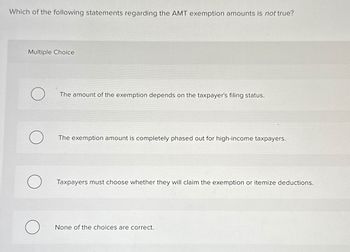
FINANCIAL ACCOUNTING
10th Edition
ISBN: 9781259964947
Author: Libby
Publisher: MCG
expand_more
expand_more
format_list_bulleted
Question

Transcribed Image Text:Which of the following statements regarding the AMT exemption amounts is not true?
Multiple Choice
O
O
O
The amount of the exemption depends on the taxpayer's filing status.
The exemption amount is completely phased out for high-income taxpayers.
Taxpayers must choose whether they will claim the exemption or itemize deductions.
None of the choices are correct.
Expert Solution
This question has been solved!
Explore an expertly crafted, step-by-step solution for a thorough understanding of key concepts.
Step by stepSolved in 5 steps

Knowledge Booster
Similar questions
- A taxpayer can not claim the hefalth insurance premium tax credit if?arrow_forwardDo income exclusions provide taxpayers “tangible” benefits Is the IRS appearing to be socially responsible when it excludes from gross income, living expenses, property damage and funeral expenses tied to Disaster Relief, employer payments to deceased employees surviving family members, insurance proceeds for the terminally ill and other similar considerations? Is there some underlying purpose for offering exclusions to taxpayers?arrow_forwardTrue or False.arrow_forward
- Do not give image formatarrow_forwardWhich one of the following is not true of itemized deductions of an individual taxpayer? Deductions for AGI are generally preferable to itemized deductions. Itemized deductions are deductible only if they exceed a taxpayer's standard deduction. Residential interest is a common example of an itemized deduction. All employee trade or business expenses are itemized deductions.arrow_forwardIn almost all cases, making contributions to an RRSP will provide the deferral of income tax. In some cases, making such contributions may result in avoidance of tax. Explain these statements.arrow_forward
- 1. What is the tax preparer required to disclose before allowing a customer to apply for a Financial Product? a) All filing and product options available to the customer, including those with no additional costs b) The timing and costs associated with each refund option c) All fees and/or repayments that will be deducted from the refund d) All of the above e) Nothing. The tax preparer is not required to disclose anything to the customer.arrow_forwardAlicia and Marie own a vacation home at the beach. During the year, they rented the house for 42 days (six weeks) at $890 per week and used it for personal use for 58 days. The total costs of maintaining the home are as follows: Hortgage interest Property taxes Insurance utilities Repairs Depreciation Required: a. What is the proper tax treatment of this information on their tax return using the Tax Court method? Note: Use 365 days in a year. Round your intermediate computations to 5 decimal places and final answers to nearest whole dollar value. Income Mortgage interest Property taxes Insurance Uits Repairs Show Transcribed Text Repairs Depreciation Net income $ Tex court method IRS method Schedule E $4,200 700 1,200 3,200 1,900 5,500 Direct allocation method i Appropriation method Oral mathe Schedule A b. Are there options available for how to allocate the expenses between personal and rental use? Note: You may select more than one answer. Single click the box with the question mark…arrow_forwardChoose the response that accurately completes the following sentence. To meet one of the due diligence requirements of a paid tax preparer, it is not enough to ask more questions; tax preparers must also:arrow_forward
- Which of the following is NOT true about an RESP? Select one: a. Withdrawals are taxed in the hands of the beneficiary b. There is a lifetime contribution limit per beneficiary c. The federal government subsidizes the parents' deposits with a grant d. Deposits are not deductible, beneficiary's withdrawals are not taxablearrow_forwardAc. Which of the following statements regarding the home office deduction is true? In order to qualify for the deduction, a portion of the taxpayer's home must be used regularly and exclusively to meet with clients or customers. A home office deduction is not allowed for using the home office for administrative or management activities only. The home office deduction is limited to the taxable income of the business before the deduction. A depreciation deduction is not allowed for a home office.arrow_forwardA single taxpayer, under age 65, who is a dependent of another taxpayer, has to file a tax return if their unearned income exceeds more than which amount?arrow_forward
arrow_back_ios
SEE MORE QUESTIONS
arrow_forward_ios
Recommended textbooks for you

 AccountingAccountingISBN:9781337272094Author:WARREN, Carl S., Reeve, James M., Duchac, Jonathan E.Publisher:Cengage Learning,
AccountingAccountingISBN:9781337272094Author:WARREN, Carl S., Reeve, James M., Duchac, Jonathan E.Publisher:Cengage Learning, Accounting Information SystemsAccountingISBN:9781337619202Author:Hall, James A.Publisher:Cengage Learning,
Accounting Information SystemsAccountingISBN:9781337619202Author:Hall, James A.Publisher:Cengage Learning, Horngren's Cost Accounting: A Managerial Emphasis...AccountingISBN:9780134475585Author:Srikant M. Datar, Madhav V. RajanPublisher:PEARSON
Horngren's Cost Accounting: A Managerial Emphasis...AccountingISBN:9780134475585Author:Srikant M. Datar, Madhav V. RajanPublisher:PEARSON Intermediate AccountingAccountingISBN:9781259722660Author:J. David Spiceland, Mark W. Nelson, Wayne M ThomasPublisher:McGraw-Hill Education
Intermediate AccountingAccountingISBN:9781259722660Author:J. David Spiceland, Mark W. Nelson, Wayne M ThomasPublisher:McGraw-Hill Education Financial and Managerial AccountingAccountingISBN:9781259726705Author:John J Wild, Ken W. Shaw, Barbara Chiappetta Fundamental Accounting PrinciplesPublisher:McGraw-Hill Education
Financial and Managerial AccountingAccountingISBN:9781259726705Author:John J Wild, Ken W. Shaw, Barbara Chiappetta Fundamental Accounting PrinciplesPublisher:McGraw-Hill Education


Accounting
Accounting
ISBN:9781337272094
Author:WARREN, Carl S., Reeve, James M., Duchac, Jonathan E.
Publisher:Cengage Learning,

Accounting Information Systems
Accounting
ISBN:9781337619202
Author:Hall, James A.
Publisher:Cengage Learning,

Horngren's Cost Accounting: A Managerial Emphasis...
Accounting
ISBN:9780134475585
Author:Srikant M. Datar, Madhav V. Rajan
Publisher:PEARSON

Intermediate Accounting
Accounting
ISBN:9781259722660
Author:J. David Spiceland, Mark W. Nelson, Wayne M Thomas
Publisher:McGraw-Hill Education

Financial and Managerial Accounting
Accounting
ISBN:9781259726705
Author:John J Wild, Ken W. Shaw, Barbara Chiappetta Fundamental Accounting Principles
Publisher:McGraw-Hill Education